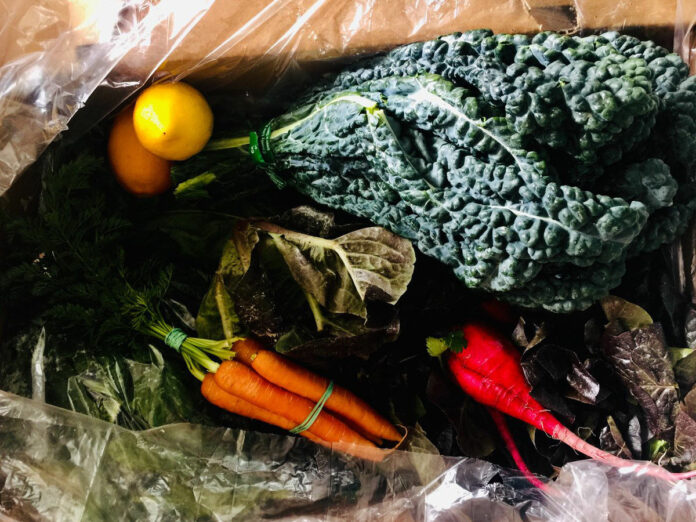
F.E.E.D. Sonoma launches food bin program, pivots to farmer and employee-ownership
Farm food hub F.E.E.D. Sonoma recently announced two big changes to the company: It has started offering weekly F.E.E.D. bins, a CSA box made up of produce from dozens of local farms, and it switched its business model to being farmer- and employee-owned.
Up until recently, F.E.E.D. served as a food hub helping local farms get products to restaurants, caterers and other distributors. Now, it’s expanded to include selling a boxes of food to community members.
“Part of the initial intention of F.E.E.D. from my purview has been to evolve the infrastructure and the organizational structure into a cooperative,” said co-founder Tim Page. “Another major tenant of our functionality is creating generational succession. We want to ensure that the infrastructure we’re building is able to continue to the next generation and beyond as long as it’s necessary.”
In the beginning of April, Page was getting ready to announce F.E.E.D.’s switch to a farmer- and employee-owned cooperative, while also working out the kinks in the company’s then-newly launched food bin program. For him, both changes were about creating a more sustainable agricultural-based future for F.E.E.D. and for farmers as a whole.
“We’re going to become the first farmer and employee-owned fresh produce cooperative in the entire state of California,” he said. “The reason I bring that up is because the F.E.E.D. Bin program, which we’ve launched as this major connection to society, was always intended to be launched in this slower roll-out method with the cooperative itself.”
While the launch happened quicker than planned due to increased food demand from the public and decreased demand from F.E.E.D.’s regular wholesale accounts, the program has gained traction. In its first week, 90 F.E.E.D. Bins were created, in its second week (the first after it launched the F.E.E.D. bin program) there were 400 boxes, in the third week there were 800 and the numbers have kept growing.
“It’s been an amazing journey,” Page said. “In reality, it’s always been the strategy to engage directly with the public and create a revenue stream where society can invest in the building of the infrastructure.”
F.E.E.D. Sonoma gained its footing in various locations in Sebastopol, eventually landing in a spot at The Barlow, where it operated for around four and a half years. The food hub left Sebastopol in 2018 and is now located in Petaluma.
“When we started in 2011, it was 15 (farms), and as of now there’s a myriad of sizes of farms but over the course of a 12-month year we will now help sell products from 100 farmers and producers in our bioregion. Some of those farms are super consistent,” he said.
While not all of the farms sell produce through F.E.E.D. year-round, Page said that some local farms that may be contributing right now include Bernier Farms in Geyserville, and Russian River Farms and Front Porch Farm in Healdsburg.
Other local contributors include New Family Farm, Gourmet Mushrooms/Mycopia Pink Barn Farm in Sebastopol.
He noted that since the season is just getting started locally, there are less contributing farms than there would be during a more active part of the growing season.
Page said that some of the main components of the farms that they partner with include “organic or beyond organic practices” as well as a focus on hyper-local farming.
“We’re a little more micro-focused on a bioregional level as far as supply goes,” he said, explaining that the produce they distribute will only come from Sonoma County and its immediate surrounding environments.
One of the things he hopes to emphasize to people subscribing to the weekly F.E.E.D. bin is that the support for farmers and local agriculture should continue beyond the current pandemic.
“It’s really amazing that we get this energy right now, because we need to F.E.E.D. people right now,” he said. “But it’s also really important to note that this has happened in the fires and floods in ’18 and ’19 and it’s happening again with the virus. The biggest piece for us is that we thank you for plugging in — we’re super grateful, this is why we do what we do — and the next step is please stay connected. If you want it to be vital in times of need, we need you to stay connected.”
To find out more about F.E.E.D. Sonoma or F.E.E.D. Bins, visit feedsonoma.com.







